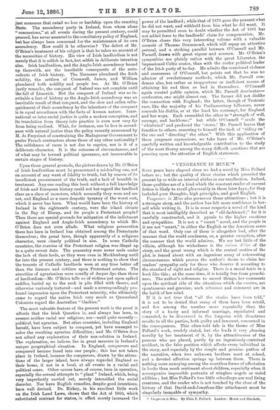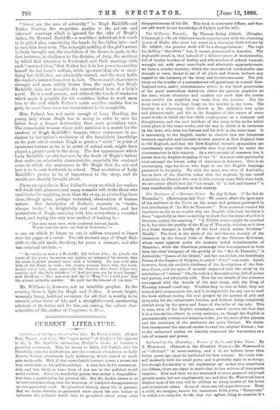"VENGEANCE IS MINE."
SOME years have elapsed since we had a novel by Miss Pollard before us ; but the quality of those stories which preceded the present by so wide an interval abides in our recollection. Indeed, those qualities are of a kind which the constant reader of current fiction is likely to recall pleasurably in these later days ; for they included pure thoughts, high principles, and good English.
Vengeance is Mine also possesses those attractions ; but it is a stronger story, and the author has felt more confidence in her- self while writing it. It is in some respects a novel of the kind that is most intelligibly described as "old-fashioned ;" for it is carefully constructed, and it ppeals to the higher emotions and sympathies. It is not a " smart " novel, and the people in it are not "smart," in either the English or the American sense of that word. Only one of them is altogether bad, after the manner that the world condemns, or, a greater exception, after the manner that the world admires. We see but little of the villain, although his wickedness is the raison d'être of the story, and the great wrong which is the central motive of the plot, is fenced about with an ingenious array of extenuating circumstances, which proves the author's desire to claim her readers' sympathy only for those who deserve it according to the standard of right and religion. There is a moral tonic in a book like this ; at the same time, it is totally free from preachi- ness. The author's references to sacred things, her comments upon the spiritual side of the situations which she creates, are spontaneous and genuine; such reference and comment are in the habit of her mind.
If it is not true that "all the stories have been told," it is not to be denied that many of them have been retold, and few among the number more repeatedly than the story of a hasty and informal marriage, repudiated and concealed, to be discovered in the long-run with disastrous results to all the parties, both guilty and innocent, concerned in the consequences. This often-told tale is the theme of Miss Pollard's work, crudely stated, but she lends it very pleasing novelty by her treatment of it, by the attractiveness of the persons who are placed, partly by an ingeniously-contrived accident, in the false position which affects every individual in. the story, and especially by the simple and genuine pathos of the narrative, when two unknown brothers meet at school, and a devoted affection springs up between thorn. There is nothing more annoying among the countless forms of affectation in books than mock sentiment about children, especially when it accompanies impossible portraits of wingless angels or weird oddities ; but Miss Pollard's two little schoolboys are real living creatures, and the reader who is not touched by the close of the history of that David-and-Jonathan-like attachment must be singularly incapable of sympathy.
* Vengeance is Mine. By Eliza F. Pollard. London : Hurst and Blackett.
"Sweet are the uses of adversity" to Hugh Radcliffe and Esther Dunbar, the respective parties to the private and informal marriage which is ignored for the sake of Hugh's
father, Sir Howard Radcliffe—a worthless individual, but much to be pitied also, considering the hands he has fallen into—and to save him from ruin. The untaught nobility of the girl's nature is finely brought out, the resolution of the lovers to part, in the
first instance, in obedience to the dictates of duty, the accident by which that intention is frustrated, and their marriage with such " maimed rites," that Esther has it in her power to sacrifice herself for her lover's welfare, while ignorant that she is sacri- ficing her child also, are admirably related, and the story holds the reader's interest from first to last. The woman's character is stronger and more subtly drawn than the man's, but Hugh Radcliffe does not resemble the conventional hero of a lady's novel. He is a real person ; and without the touch of weakness which made it possible for his worthless father to work upon him to the end which Esther's noble sacrifice enables him to gain, he must have been too inconsistent to be acceptable.
Miss Pollard has not made enough of Lucy Harding, the young lady whom Hugh has to marry in order to save his father from a deeper destruction than mere pecunlary ruin. The remarkable woman whose cold ambition is a match for the candour of Hugh Radcliffe's despair, whose composure is un- shaken by her father's revelation of the fraudulent knowledge on his part which renders Hugh as great a "catch" in point of imminent fortune as he is in point of actual rank, might have played a greater part in the story. The few appearances which Lady Radcliffe (as she becomes by the death of Hugh's father) does make are admirably characteristic, especially the conjugal scene in which she announces to Sir Hugh that his son and heir is to be sent forthwith to school. That resolution of Lady Radcliffe's proves to be of importance to the story, and its results are cleverly brought about.
There are episodes in Miss Pollard's story on which her readers will dwell with pleasure, and many remarks will strike those who read books for anything more than the story, as proceeding from close, though quiet, perhaps restricted, observation of human nature. Her description of Esther's resource in "books, always books," is delightfully real and heartfelt; and her portraiture of Hugh, carrying with him everywhere a wounded heart, and trying the only true method of healiug it,—
" The man most man, with tenderest human hands, Works best for men—as God in Nazareth,"—
is one on which to linger as one is seldom tempted to linger over the pages of a novel. The old steward says of Hugh Rad- cliffe to the old uncle, Geoffrey, for years a stranger, and who has returned too late :—
"'Ha works as never a Radcliffe did before him ; he pleads the cause of the poor; he metes out justice so tempered by mercy, that his name is never uttered save with a blessing. No one ever asks help of Sir Hugh in vain ; the county prisons know him, the work- houses know him, more especially the women who have fallen into trouble, and the little children.'—' And yet you say he is not happy,' said Geoffrey.—` No! nor ever will be.'—' Why P'—` I told you,' was the almost irritable answer. 'He paid for the bower of his race.'"
Mr. Williams is, however, not an infallible prophet. In the evening there is light for Hugh and Esther. A sweet, bright, womanly fancy, habitual reverence for all that is worthy to be revered, sober views of life, and a straightforward, unswerving
estimate of its duties and its ties, are among the salient char- acteristics of the author of Vengeance is Mine.



































 Previous page
Previous page